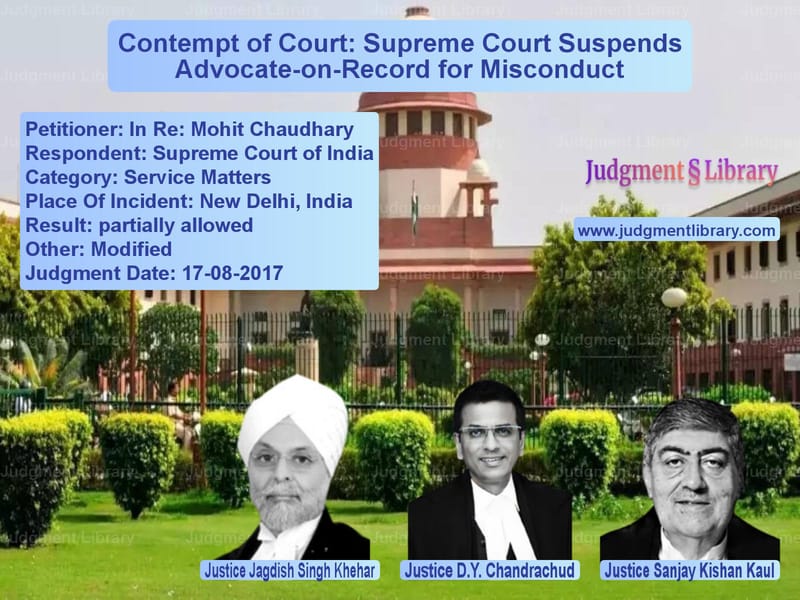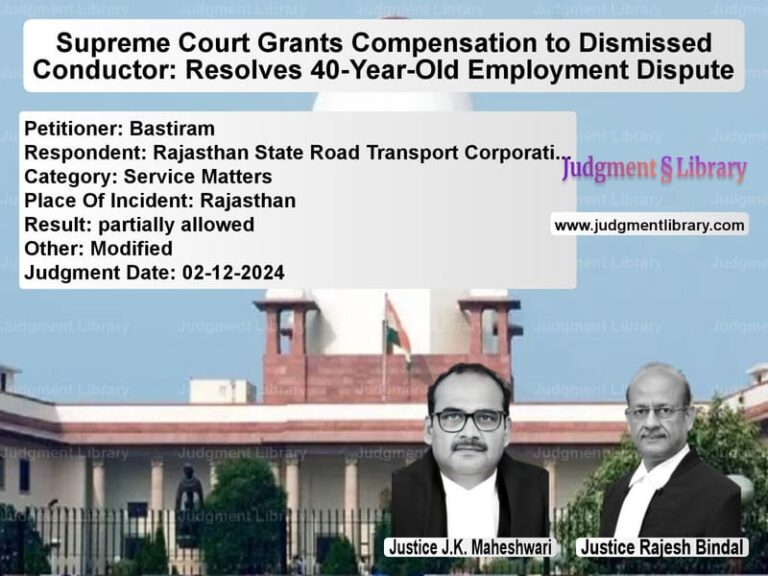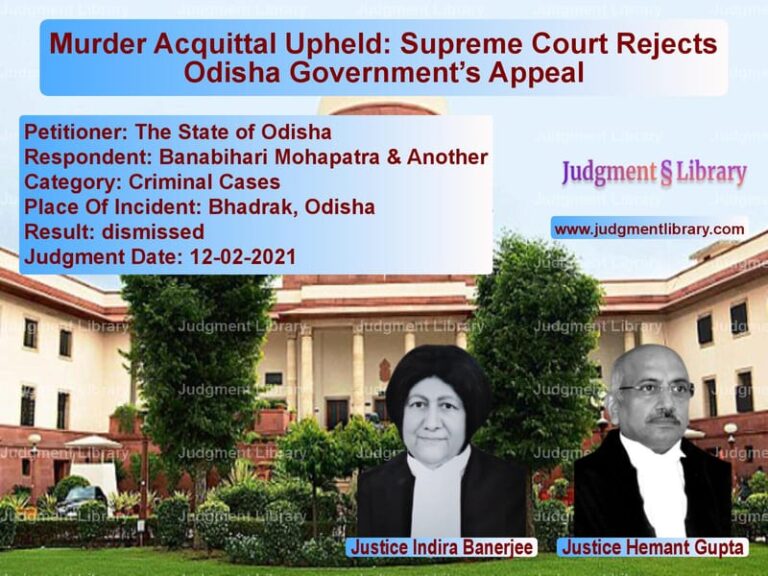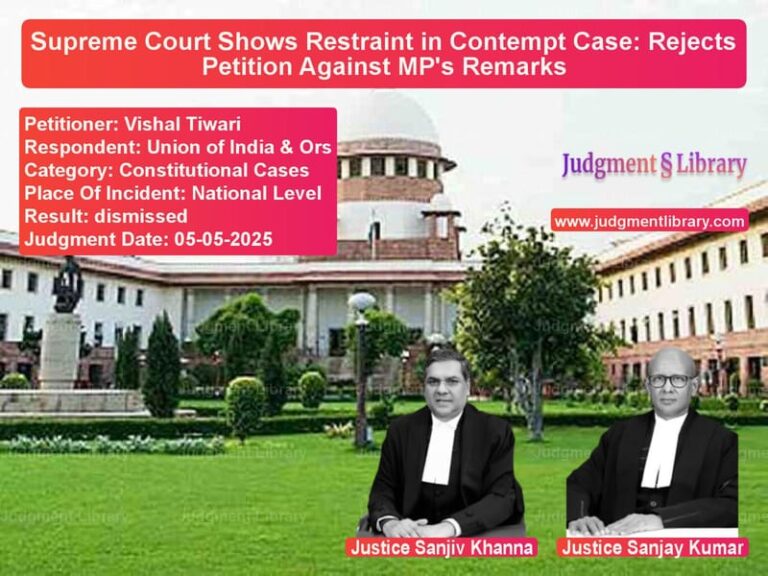Contempt of Court: Supreme Court Suspends Advocate-on-Record for Misconduct
The case of In Re: Mohit Chaudhary, Advocate is a landmark Supreme Court ruling concerning contempt of court and professional misconduct by an Advocate-on-Record. The case arose from allegations made by the advocate against the Supreme Court Registry, accusing it of bench hunting and manipulative listing of cases. The Court initiated suo motu contempt proceedings and ultimately suspended the advocate from practicing as an Advocate-on-Record for one month.
The ruling underscores the duty of legal professionals to uphold the integrity of the judicial process and demonstrates the Court’s intolerance toward baseless accusations that undermine trust in the judiciary.
Background of the Case
The contemnor, Mohit Chaudhary, an Advocate-on-Record practicing since 2009, approached the Court on April 7, 2017, during morning mentioning hours, in an agitated and aggressive manner. He accused the Registry of manipulating case listings to favor certain parties. He handed a letter to the Court, alleging:
- That a high-stakes real estate dispute in Mumbai had been listed hastily and suspiciously before a Special Bench.
- That the Registry had manipulated the cause list, deviating from the standard procedure.
- That judicial propriety had been violated in favor of one party.
Upon examination, the Court found these claims to be palpably false. The matter had been listed per judicial orders, not at the Registry’s discretion. The letter, accompanied by articles on ‘bench hunting,’ left no doubt about the direction of the advocate’s allegations. The Court initiated contempt proceedings on the same day.
Key Legal Issues
- Whether making false allegations against the Supreme Court Registry amounts to contempt of court.
- Whether an Advocate-on-Record is permitted to accuse the judicial system of bias without evidence.
- Whether the contemnor’s subsequent apology mitigates his liability.
- What disciplinary action should be imposed on an advocate who engages in professional misconduct?
Arguments by the Petitioner (Mohit Chaudhary)
The contemnor, represented by senior counsel, argued that:
- His accusations were made in good faith, based on information received from his client.
- He had no personal motive and acted solely in his client’s interest.
- He was unaware that the listing of the case had been directed by a judicial order.
- He had tendered an unconditional apology, retracting every word of his letter.
- He had an otherwise unblemished career and requested leniency.
Arguments by the Respondent (Supreme Court)
The Supreme Court, acting as the respondent in the contempt proceedings, countered with the following arguments:
- The contemnor, being an Advocate-on-Record, was fully aware that the Registry does not assign benches or manipulate listings.
- The allegations were designed to mislead the Court and pressure it into reassigning the case to a different bench.
- Accusing the Registry of bias, without evidence, amounted to professional misconduct and contempt of court.
- While an apology was offered, the timing and nature of the retraction suggested it was motivated by the looming contempt proceedings rather than genuine remorse.
Supreme Court’s Judgment
The Supreme Court, in a judgment delivered by Justice Jagdish Singh Khehar, Justice Dr. D.Y. Chandrachud, and Justice Sanjay Kishan Kaul, found the contemnor guilty of contempt of court and professional misconduct.
1. False Allegations Undermine Judicial Integrity
The Court held that the contemnor’s accusations were baseless and damaging to the judiciary’s integrity:
“The contemnor’s allegations sought to scandalize the Court and Registry, and were not based on any credible evidence. The objective was clear—to engineer a bench shift under the garb of baseless accusations.”
2. No Advocate is Above Professional Conduct Rules
The Court emphasized that an Advocate-on-Record has additional responsibilities:
“An Advocate-on-Record is not merely a legal representative but an officer of the Court. Such privileges come with obligations, and conduct unbecoming of an officer of the Court warrants disciplinary action.”
3. Apology Considered, But Not a Full Mitigating Factor
While acknowledging the contemnor’s unconditional apology, the Court noted:
“A retraction and apology, though a relevant factor, does not erase the initial act of contempt. The contemnor’s actions were deliberate, and an advocate of his experience ought to have known better.”
4. Suspension from Practice as an Advocate-on-Record
The Court exercised its powers under Order IV, Rule 10 of the Supreme Court Rules and suspended the contemnor from practicing as an Advocate-on-Record for one month:
“We are thus of the view that the appropriate course of action would be that the contemnor is not permitted to practice as an Advocate-on-Record for a period of one month from the date of this order.”
Key Takeaways from the Judgment
- Contempt of court applies to false accusations: Advocates cannot level baseless allegations against the judiciary without consequences.
- Professional ethics are paramount: Advocates-on-Record have heightened duties to uphold judicial integrity.
- An apology does not always absolve contempt: A retraction may mitigate punishment but does not negate liability.
- The Supreme Court has the authority to discipline lawyers: Under its rules, the Court can suspend advocates for misconduct.
Impact of the Judgment
This ruling has far-reaching implications for legal ethics and professional conduct. It establishes that:
- Lawyers must exercise caution before making public allegations against the judiciary.
- Contempt proceedings can be initiated even against senior advocates if they act irresponsibly.
- The Supreme Court has the authority to suspend advocates who engage in misconduct.
Conclusion
The Supreme Court’s ruling in In Re: Mohit Chaudhary, Advocate reinforces the importance of maintaining judicial decorum and professional ethics in the legal fraternity. By suspending the contemnor from practicing as an Advocate-on-Record, the Court sent a strong message that baseless accusations against the judiciary will not be tolerated.
The ruling upholds the principle that while advocates have the right to represent their clients, they must do so within the framework of professional ethics and without undermining the integrity of the judicial process.
Don’t miss out on the full details! Download the complete judgment in PDF format below and gain valuable insights instantly!
Download Judgment: In Re Mohit Chaudha vs Supreme Court of Ind Supreme Court of India Judgment Dated 17-08-2017.pdf
Direct Downlaod Judgment: Direct downlaod this Judgment
See all petitions in Legal Malpractice
See all petitions in Contempt Of Court cases
See all petitions in Public Sector Employees
See all petitions in Judgment by Jagdish Singh Khehar
See all petitions in Judgment by Dhananjaya Y Chandrachud
See all petitions in Judgment by Sanjay Kishan Kaul
See all petitions in partially allowed
See all petitions in Modified
See all petitions in supreme court of India judgments August 2017
See all petitions in 2017 judgments
See all posts in Service Matters Category
See all allowed petitions in Service Matters Category
See all Dismissed petitions in Service Matters Category
See all partially allowed petitions in Service Matters Category







